- Get link
- X
- Other Apps
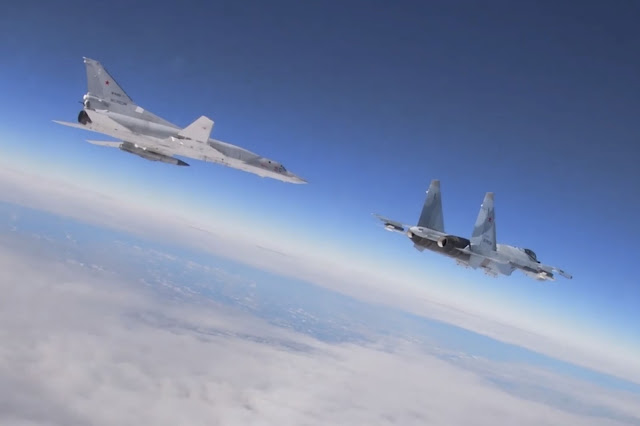 |
| Russian forces in Belarus for a large military exercise called 'Soyuznaya Reshimost' (Allied Resolve) 2022. VKS Tu-22M3 and Su-35S over Belarus airspace. |
Editors Note: Fluid situation. Information will change
24-Feb, 2022: D-Day for Ukraine. Russian forces attack the country. We will spawn a new post shortly. A massive attack opened by 3M-54 Kalibr cruise missiles, 9K720 Iskander ballistic missiles, K-55 cruise missiles, plus VKS aviation. Russian armor formation on the move into Ukraine. Detail forthcoming.
 |
| Areas stuck by Russian forces on 24-Feb, 2022. |
Given the size of the US buildup preceding the 2003 American invasion of Iraq- that was done in plain sight - we concluded that the Russian buildup was similar enough - to constitute an eventual actual large-scale military attack.
In this case, it is not Nigerian yellowcake forgeries or fairytale WMDs but Kremlin's displeasure over NATO's eastward expansion and Ukraine also becoming the newest NATO member. We don't expect Moscow to start waving glass vials at the UN, but a concerted cover story will be sold to ordinary Russians at home - who is the Kremlins' only audience of concern. Russian forces are now to stay in Belarus.
The real tragedy of the 2003 Iraq War was not only the ~ 2.4 million Iraqi casualties as the result of the invasion - but the shredding of the rules-based international system built after WWII - by the Americans themselves. After 2003 the United States can no longer point fingers. The Kremlin can simply use the American Iraq playbook on Ukraine. Estimates are between 1.5 and 3.4 million Iraqi dead since the 2003 invasion.
Nice job.
Having said that - our own research strongly suggests that NATO is not a military threat to Russia because of Russia's ability to mitigate NATO airpower projection rather easily by neutralizing NATO air refueling tankers and AWACS ops in the air and on the ground.
This was all predicted.
22-Feb 2022: The Kremlin ordered their tanks into separatist-controlled areas of Ukraine as "peacekeepers" after the Russian State Duma recognized Donbas areas in Ukraine as independent.
21-Feb-2022: The Kremlin will recognize the Russian-controlled territories in southeast Ukraine as independent states. The recognition appears larger than the areas in pink. We think more war is coming to Donbas.
20-Feb 2022: American U2 slights over Ukraine. Kremlin reports strategic force exercise fires: Kinzhal missiles, Russian Navy and submarines fire Kalibr AShM, and Tsirkon missile against onshore and offshore targets, Iskander BM launched from Kapustin Yar, ICBM Yars launched from Plesetsk to Kura, Tu-95MS launched cruise missiles to Kura and Pemboy ranges, Delta-IV Karelia launched SLBM Sineva from the Barents Sea to Kura.
19-Feb, 2022: Video appears showing Russian tanks. The location was unknown. We identify the type as T-72B3-UBH obr. 2016g (with 2S24 soft ERA bag mounted add-on side armor on track skirts).
18-Feb, 2022: A big increase in shelling around Donbas. Also, scheduled cruise missile firing has just been announced by Kremlin. Gas pipeline explosion in Verhunka, near Luhansk. Also, Russia turns on its Container (29B6) radar.
[Below] Container (29B6) radar (Russian: 29Б6 «Контейнер») is the new generation of Russian over-the-horizon radar with separate transmitter and receiver units 300km apart operating in the 3-30 MHz HF-band. These radars are bad news for stealth.
16-Feb, 2022: Conflicting reports filter in that Russia may have begun to withdraw from the Ukrainian border. We deliberately held back on writing a post on this topic, to begin with, because of our sense that a Russian attack was not a guarantee. But the run-up to the 2003 US invasion of Iraq - forced us to consider other possibilities. Let's see what develops.
We have been watching events in Ukraine since 2014 and particularly now at the beginning of 2022 as tensions involving Ukraine escalate. Ukraine's economy was cast into the abyss during the 2008-09 Wall Street crash - which helped propel a sequence of events in Ukraine that have brought us into the current situation.
12-Feb, 2022: Washington, London, Paris, Berlin, and Moscow (Moscow) are removing non-essential staff from their embassies in Kyiv.
Assertions of probable massive Russian losses at the hands of Ukrainian ATGM and MANPADs are perhaps possible but we think unlikely. What is far (far) more likely is serious IFF/fratricide risks/concerns.
Both sides are using effectively identical equipment. Both sides fly Mi-24, Mi-8, Su-24, Su-25, Su-27, MiG-29, and nearly identical mechanized tank/armor types. How IFF (just simple visual ID - never mind radio transponder/interrogation mechanics) would play out in a major Russia/Ukraine military confrontation appears a daunting proposition, to say the least. During the Russo-Georgian War three (3) Russian aircraft were downed in fratricide events.
Current Order of Battle (ACIG) as of Feb-11, 2022
Russia:
Russia has sufficient troops for an invasion. Roughly 100,000 regular troops deployed in southern Belarus and south-western Russia consisting of eighty (80) Russian battalion tactical groups (BTG) with another 14 in transit. The number could reach 100 BTGs with 175,000 troops shortly. 3000 military contractors (mercenaries) from Rosgvardia, Slavonic Corps, Wagner Group, Kadyrovtsy, plus ~ 2000 Russian troops in Transnistria.
Sufficient ammunition stocks, field hospitals, and fuel access.
2x S-400 SAM-systems in Belarus, and three S-300V air defense systems in southwest Russia.
500 FSB, 5000 VDV/SF troops (Omon, Border Guards, Federal National Guard, and army reservists).
Iskander-M brigades moved close to Ukriane.
Heavy artillery including 2S7 Pion and 2S7M Malka long-range guns caliber 203mm (both have a range of 50k and are deployed near Belgorod, only 17km from the Ukrainian border).
Krasukha-4, Murmansk-BN, and ROSC-1 EW-systems to counter UAVs (also known as 117Zh6 RLC-MC Valdai radar/electro-optical complex).
4x amphibious assault ships (all Project 775/Ropucha-class) - LSTM Kaliningrad/102, Minsk/127, Korolev/130, and one more (hull number 71), in the Black Sea, escorted by cruiser Moskva, Marshal Ustinov, frigates Admiral Kasatonov and admiral Kulakov. AGI ships for intelligence collection off the Ukrainian coast.
Forward-deployed interceptors, fighter-bombers, and helicopters.
"A BTG usually is based around an infantry battalion’s three motor-rifle infantry companies (each with 11 BMP tracked fighting vehicles or BTR-80/82 personnel carriers), but reinforced by a fourth tank company with 10 tanks, typically T-72B3s. For tank BTGs, that ratio is reversed."
Russian MBT spotters guide:
 |
| T-72 late |
 |
| T-72 B3 |
 |
| T-72 B3 |
 |
| T-72 B3 |
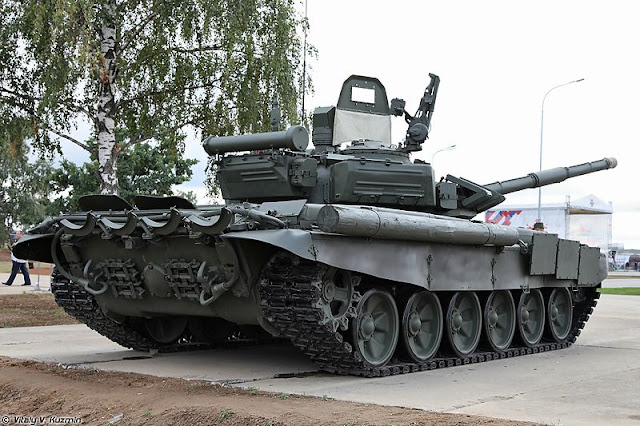 |
| T-72 B3M/B4 |
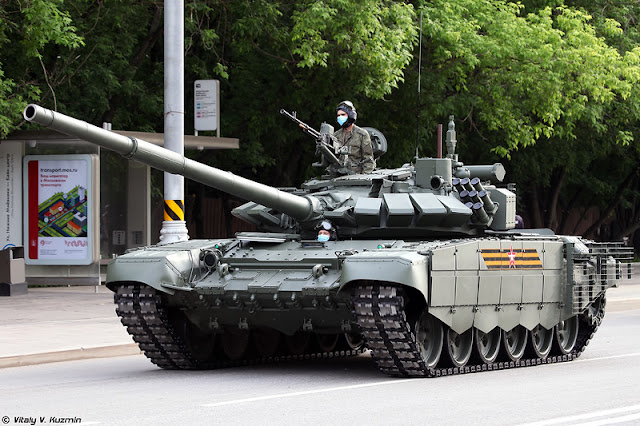 |
| T-72 B3M/B4 |
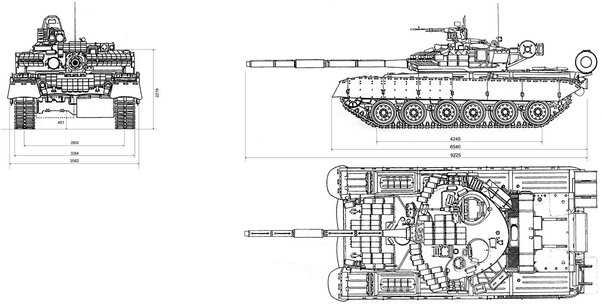 |
| T-80 |
 |
| T-80 BVM |
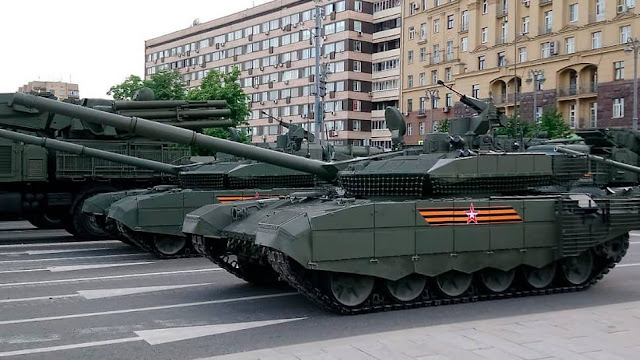 |
| T-90 M |
Ukraine:
180,000 professional troops, right now it only has about 100,000 trained servicemen. Could mobilize around 100,000 reservists, but unlikely. ORBAT (Order of Battle) here.
Ukrainian Air Force (UkrAF)
6x squadrons with about 70 MiG-29s, ~ 40 of which are operational.
4x squadrons with about 50 Su-27s, only some 25-35 are operational.
The UkrAF is critically short of pilots.
Arms transfer mostly of ATGMs over the last month. 11 British, 8 US, 2 Canadian, 1 Polish, and 1 Turkish military transport are known to have landed in Ukraine, delivering arms. British and American trainers involved in training the Ukrainians in the use of ATGMs are about to withdraw.
Disposition of Ukrainian mechanized units unclear.
Ukraine MBT spotters guild :
 |
| T-64 |
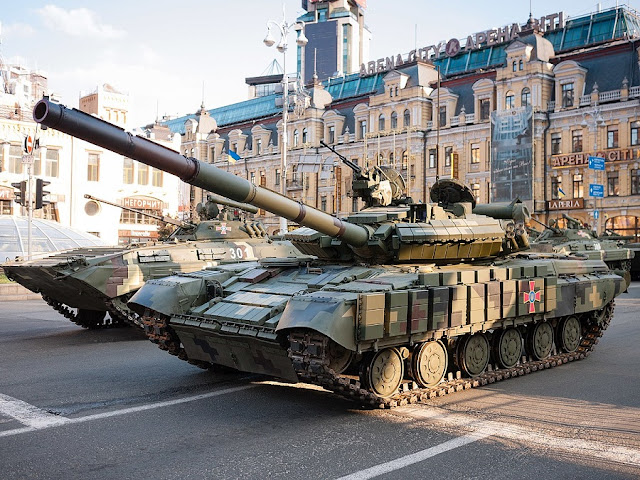 |
| T-64 BV |
 | |
|
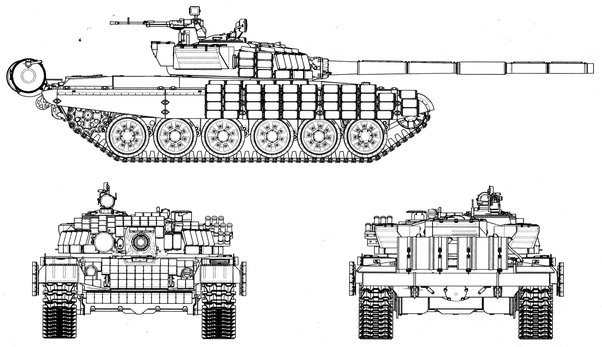 |
| T-72 |
 |
| T-72 UA1 |
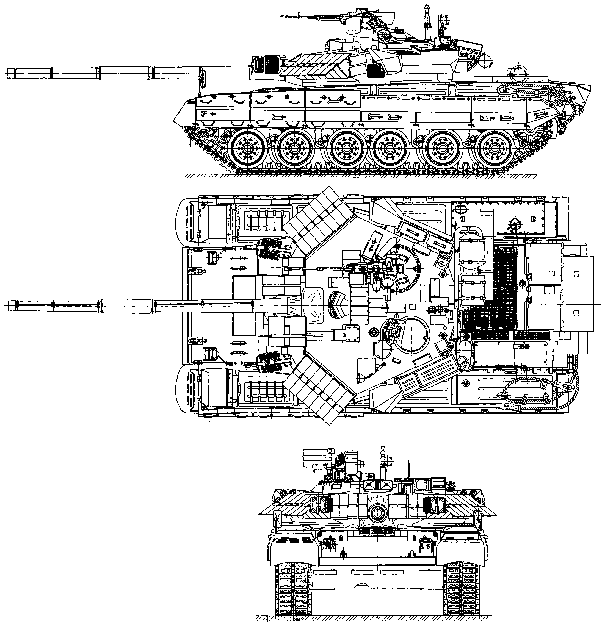 |
| T-84 |
 |
| T-84 U |
 |
| T-84 (Oplot) |
-end-
NATO and Swedish COMINT/ELINT/SIGINT-aircraft - including E-8Cs, P-8As, RQ-4s, E-3s, MQ-9s, EP-3Es, P-3Cs, RC-12Xs, and RC-135W/V has been patrolling from the Baltic Sea down to the Black Sea since mid-December 2021.
NATO will be a spectator to any Kremlin military incursion into Ukraine. For the American public, Ukraine has no national or strategic interest. However, this will not stop the 'Pax Americana' inside-the-DC beltway national-security hawks from trying to convince the American public otherwise.
Ignore them.
NATO's open-door policy and promises not to expand do not (did not) operate in a vacuum.
For our background analysis on Ukraine including the non-reported American/Wall Street role in imploding the Ukrainian economy via the 2007-2009 Wall Street financial crisis that helped propel the Donbas area of Ukraine into a civil war - please see here.
A military confrontation with Russia would represent a peer-to-peer engagement. The American military has not fought a war against a peer adversary since the Korean war. In that war, the United States was unable to establish and maintain air supremacy over the Korean Peninsula. That war ended in a stalemate and ceasefire without US victory.
We wrote back in 2014 about what we think would happen in any Russia/NATO military confrontation. Also, see here and here. With respect to airpower effectively the confrontation would quickly devolve into aircraft dispersal to/from vehicle roadways and NATOs AWACS and in-flight refueling tanker fleets being pushed far out to the edge of the battlespace - where they would have little utility. Without effective airpower projection, US military power-projection doctrine - unravels. American expensive advanced stealth fighter fleets will have no demonstrable effect on any of this because of the reasons we discuss here.
The writing below originally appeared in 'Time' on 25-January, 2022 written by Anatol Lieven - and we believe captures the current overall situation regarding Ukraine very well.
Original full article link: https://time.com/6141806/russia-ukraine-threats/
"Russia Has Been Warning About Ukraine for Decades. The West Should Have Listened"
By Anatol Lieven - January 25, 2022, 3:20 PM EST
When I was a journalist for The Times (London) in Moscow in December 1992, I saw a print-out of a speech by the then Russian foreign minister, Andrei Kozyrev, warning that if the West continued to attack vital Russian interests and ignore Russian protests, there would one day be a dangerous backlash. A British journalist had scrawled on it a note to an American colleague, “Here are more of Kozyrev’s ravings.”
Andrei Kozyrev was the most liberal and pro-Western foreign minister Russia has ever had. As he stated in his speech, his anxiety about Western behavior was rooted in fear that the resulting backlash would destroy liberalism in Russia and Russian co-operation with the West. He was proved right as we see today. Yet when he expressed this fear, in entirely moderate and rational terms, he was instinctively dismissed by western observers as virtually insane.The point about this history is that the existing crisis with Russia has origins that go far beyond Putin. Russia has a foreign and security blob, just as does the United States, with a set of semi-permanent beliefs about Russian vital interests rooted in national history and culture, which are shared by large parts of the population. These include the exclusion of hostile military alliances from Russia’s neighborhood and the protection of the political position and cultural rights of Russian minorities.
The Yeltsin government protested strongly against the start of NATO expansion in the 1990s and Russia accustomed itself without too much trouble to NATO membership for the former Soviet satellites in Central Europe. But from the very beginning of NATO expansion in the mid-1990s, Russian officials and commentators—including liberal reformists—warned that an offer of NATO membership to Georgia and Ukraine would bring confrontation with the West and an acute danger of war. These warnings were echoed by George Kennan, the original architect of the strategy to contain the USSR and the State Department’s greatest ever Russia expert, as well as by Henry Kissinger and other leading American statesmen.
There is nothing mysterious, extreme, or Putinesque about this Russian attitude. In the first place, Western language about NATO expansion establishing a “Europe whole and free” implies the exclusion of Russia from Europe and from a role in Europe—a matter of deep offence to Russians, and Russian liberals in particular, especially since this Western rhetoric was imbued with the assumption (a racist one, by the way) that the word “European” equates to “civilized.” And that Russia isn’t part of that idea.
Russian fears about the expansion of a potentially hostile military alliance to Russia’s borders should be understandable to any American who has heard of the Monroe Doctrine. In Georgia and Ukraine, there are also specific issues inherited from the Soviet Union: in the case of Georgia, the separatist movements of the Abkhaz and Ossete minorities and the resulting ethnic conflicts involving Russia. Such ethnic conflicts over territory, with the involvement of outside powers, are all too common during and after the fall of empires: think for example of Turkey’s invasion of Cyprus in 1974, and Ankara’s establishment of an (internationally unrecognised) mini-state for the Turkish Cypriot minority.
In the case of Ukraine, NATO membership for that country implied the expulsion of Russia from the naval base of Sevastopol in Crimea (a city of immense importance to Russia, both strategic and emotional), and the creation of a hard international frontier between Russia and the Russian and Russian-speaking minorities in Ukraine, making up more than a third of the Ukrainian population.
The Russian establishment fears in addition that NATO would act as a cover for a program of state-backed Ukrainian ethnic nationalism intended to destroy Russian culture and the Russian language in Ukraine. These fears were increased by what happened in Estonia and Latvia, where after independence the national governments broke their previous promises to Russia and the local Russian minorities to respect their political, educational and linguistic rights—which did not prevent them joining NATO and the E.U.
None of this is intended to justify Russia’s actions, which have often been stupid as well as criminal—as with the annexation of Crimea in 2014. However, they are hardly unusually so in the context of the fall of empires and their aftermath. Did the British really behave much better as their empire came apart, let alone the French, Portuguese or Turks? A Frenchman may believe that they did; an Algerian might have a different opinion.
Much more importantly, these Russian policies have been linked to a specific set of post-Soviet issues and Russian regional goals. They are not part of some grand malign design to destroy international order, or to act as a wilful “disruptor.” Insofar as Russia has set out deliberately to damage Western interests (for instance with social media disinformation campaigns) it has been as a way to put pressure on the West in pursuit of those goals. It may also be pointed out that in the Middle East, it is the U.S. that has frequently acted as a disruptor as with the invasion of Iraq, the destruction of the Libyan state, and Trump’s decision to abandon the nuclear agreement with Iran, while Russia has often defended the status quo—partly due to a fear of Islamist terrorism that it shares with the U.S.
In other words, while the terms of any compromise with Russia over Ukraine would involve some tough negotiation, we can seek such a compromise without fearing that this will open the way for further Russian moves to destroy NATO and subjugate eastern Europe—a ridiculous idea for anyone who knows either the goals of the Russian establishment or the character of Poles and Estonians. These nations are in NATO and are categorically committed to remaining so. There is no way for Russia to remove them without a direct attack on NATO—a hideously dangerous undertaking that forms no part of the Russian establishment’s plans. NATO is in fact entirely safe within its existing borders. The threat to NATO’s safety and prestige are largely of its own making with its empty commitments to countries that it has neither the will nor the ability to defend.
There are three possible elements to a compromise with Russia, two of which the West has in effect already conceded. The first is either a treaty of neutrality or a moratorium of 10 or 20 years on Ukrainian membership of NATO. The West loses nothing by this, since it is clear that Ukraine cannot in fact join NATO with its conflicts with Russia unresolved. In any case the U.S. and NATO have made it absolutely clear that they cannot and will not defend Ukraine by force.
The second element is a return to the (Adapted) Conventional Forces in Europe Agreement limiting NATO forces in eastern Europe and Russian forces in contiguous territories. And the third is internationally-guaranteed autonomy for a demilitarized Donbas within Ukraine, according to the Minsk II agreement of 2015 brokered by Germany and France but since in effect rejected by Ukraine.
Failing at least initial moves towards such a compromise, it does indeed look likely that there will be some form of new Russian attack on Ukraine, though by no means necessarily a large-scale invasion. In the event of war, however far the Russian army marches will be followed by a new Russian proposal for a deal in return for Russian withdrawal. The only difference between then and now will be that NATO will have been humiliated by its inability to fight, the West and Ukraine will be in a much weaker position to negotiate a favorable deal—and that in the meantime, thousands of people will have died."
"Lieven is a senior fellow of the Quincy Institute for Responsible Statecraft and author of Pakistan: A Hard Country and author of Ukraine and Russia: A Fraternal Rivalry."
 |
| Russian Borei-A class ballistic missile submarine carries 16 x SLBMs with 6 x thermonuclear warheads each, for a total of 96 warheads with a range from 8,000-12,000 km (4,319 to 6,479 nmi). |
The photo above was added to remind the reader what Russia represents in a larger context. Just one Russian submarine can completely incinerate the United States. Military confrontation with Russia must be avoided. Détente with the Kremlin is the only rational policy.
NATO no longer represents the protection/preservation of liberal democracies anyway - as Turkey's continued NATO membership attests. Turkey has become an illiberal democracy/authoritarian government with a history of a porous border for Syria-based transnational Wahhabist-Salafist jihadist groups to operate, sell, and recruit.
So the Russians are right. NATO has become a rudderless military bloc - growing closer to the Russian border. Not a savior of liberal ideals.
There isn't a single NATO or Russian fighter pilot that thinks locking horns with each other would be an enjoyable experience. Let us hope cooler heads prevail - so events don't take control - and all airmen from Ukraine, Russia, and NATO - are never forced to find out.
Works Cited
Bacevich, Andrew J. Is the Confrontation Over Ukraine Joe Biden’s “Wag the Dog” Moment? Feb. 2022. www.thenation.com, https://www.thenation.com/article/world/ukraine-biden-putin-exceptionalism/.
Davies, Medea Benjamin, Nicolas J. S. “The Staggering Death Toll in Iraq.” Salon, 19 Mar. 2018, https://www.salon.com/2018/03/19/the-staggering-death-toll-in-iraq_partner/.
Murtie, Djoko Bayu. “The Essential Guides to Vehicles: T-72.” Medium, 9 Mar. 2021, https://murtie-djokobayu.medium.com/the-essential-guides-to-vehicles-t-72-996d7b9068f.
NATO Expansion: What Gorbachev Heard | National Security Archive. https://nsarchive.gwu.edu/briefing-book/russia-programs/2017-12-12/nato-expansion-what-gorbachev-heard-western-leaders-early. Accessed 23 Feb. 2022.
“Russia Has Been Warning About Ukraine for Decades. The West Should Have Listened.” Time, https://time.com/6141806/russia-ukraine-threats/. Accessed 23 Feb. 2022.
Sloat, Kemal Kirişci and Amanda. “The Rise and Fall of Liberal Democracy in Turkey: Implications for the West.” Brookings, 26 Feb. 2019, https://www.brookings.edu/research/the-rise-and-fall-of-liberal-democracy-in-turkey-implications-for-the-west/.
“Stealth Fighters; Affirming the Consequent Fallacy.” Stealth Fighters; Affirming the Consequent Fallacy, https://theboresight.blogspot.com/2021/04/stealth-fighters-affirming-consequent.html. Accessed 23 Feb. 2022.
“Times Up - Ukraine Implodes.” Times Up - Ukraine Implodes, https://theboresight.blogspot.com/2015/02/ukraine-implodes.html. Accessed 23 Feb. 2022.
“Ukrainians Complete Mission in Iraq.” Www.Army.Mil, https://www.army.mil/article/15056/ukrainians_complete_mission_in_iraq. Accessed 23 Feb. 2022.
- All media found here is for scholarship and research purposes and protected under U.S. Internet ‘Fair Use’ Law -
Comments
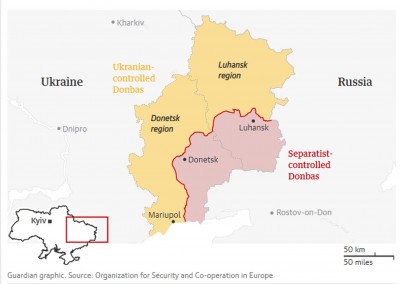


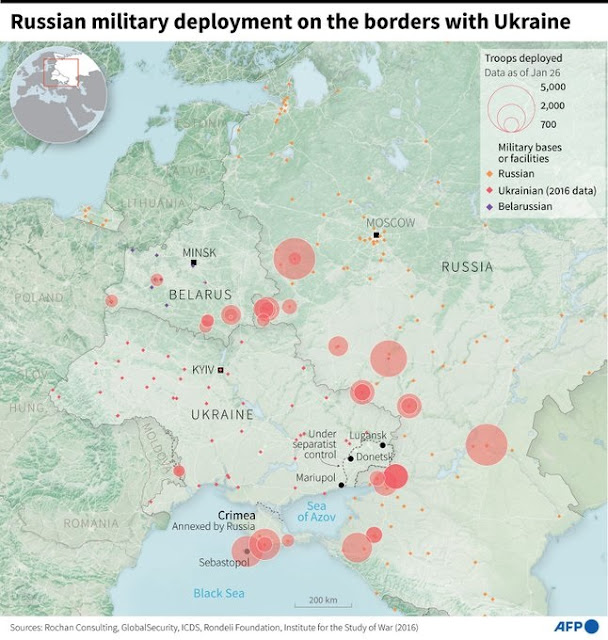


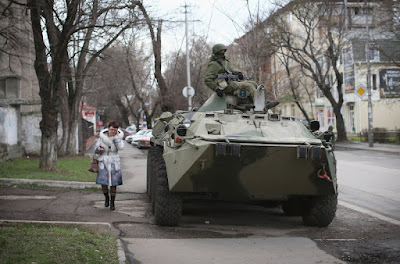
Publishing timestamp is 10-Feb 2022
ReplyDeleteVery honest reaction: the escalation is completely fictional. I don't understand how could you fall into such shallow trap.
ReplyDeleteFor example, even the prototype rabid russophobe Dmytro Kuleba is saying essentially the same thing as Russians.
There isn't going to be any invasion.
Unless something radically changes Moscow's situation, something that doesn't seem to be happening.
I hope you're right. According to Michael Kofman, research program director in the Russia studies program at the Center for Naval Analyses - he think that some type of military action appear likely. He is also a pessimist on this. See his remarks here:
Deletehttps://youtu.be/cxLEOhinvkU
To be sure the Russian military build is occurring in full view of Western satellites - so I hope you are right its just political theater. But US invasion of Iraq in 2003 and especially the run up to the 1991 Gulf War occurred with a massive military build up - in plain sight.
So the military build up forces some apprehension. As a practical matter the Americans need to stay out of getting embroiled in Ukraine. There is no national security interest for the American public. But this wont stop the US MIC (military industrial complex) from pushing for war. Giving ATGMs and MANPADs is one thing, but the repeated E-8C flights inside Ukraine (presumably sharing intel with Ukraine) constitute direct US military involvement (that is not training) using formal (US only) high-value command/control battle-management assets.
Hi Cactus, right now it appears you are right. The incessant drum beat here in America from our media that a Russian will attack appears to have clouded our analysis. Perhaps the larger question is what's going on with US intelligence? It certainly would not be the first time US intelligence gets it wrong. We should have trusted our instincts. In the future we wait till something actually occurs.
DeleteWhat's going on with US intelligence? It's simple. They play politics and they sink into playing politics more and more over time. A bit like the movie version of KGB used to be.
DeleteThere are some good people working for them, but you never hear about them, or what they do. What is "revealed" in public is almost never based on any real analysis. Not because it's not being done, but because the US intelligence has absolutely no problem with deceiving people who are supposed to make political decisions over the matter.
If you treat every public information supposedly coming from them as a lie (not a mistake), you will get much more real picture of real events. Everything saying something about 17 (or how many) US intelligence services, or anything saying "highly likely" or something similar, is later proven to be a lie and should be treated as such.
Especially post-Iraq war. Everything should be questioned, something you are usually doing on this blog.
Of course, not everything is a lie, sometimes they miscalculate (because not everyone is perfect), but in the rare occasions they are proven right, it's by accident. And when I think about it, I cannot quickly remember any example, something that surprises even myself (or I might only have bad memory, something I won't disagree with).
Hi Cactus, of course you are right. After the 2003 Iraq invasion - based on a pack of lies and frauds (faked Nigerian Yellow Cake documents signed by a man out of office for ten years) I gave up on the United States.
DeleteAfter the National Security Act of 1947 that created the Joint Chiefs and the CIA, both serve at the pleasure of the President, and as you already allude to, the head of the CIA is a political appointee.
Whatever the Russians do, everyone can say they just used the American 2003 playbook. The list of governments overthrown or attempted to be overthrown by the CIA - is as long as my arm. Nevertheless let us hope there is no (more) war in Ukraine.
Sorry we could remember is the Nigerian official had been dead or out of office - it was the latter.
"Unless something radically changes the situation for Moscow"
DeleteApparently it did. And according to Moscow itself, the rhetoric about nukes was the nail in the coffin.
So here we are. Maybe I should offer an apology.
Hi cactus,
DeleteWell nobody really knew what would happen. I didn't really think there would be an invasion. My only hesitation was it looked like 1991 and 2003 Iraq war run-up, so though well....maybe (maybe).
Anyway - it is a sad day indeed my friend.
More pointless war.